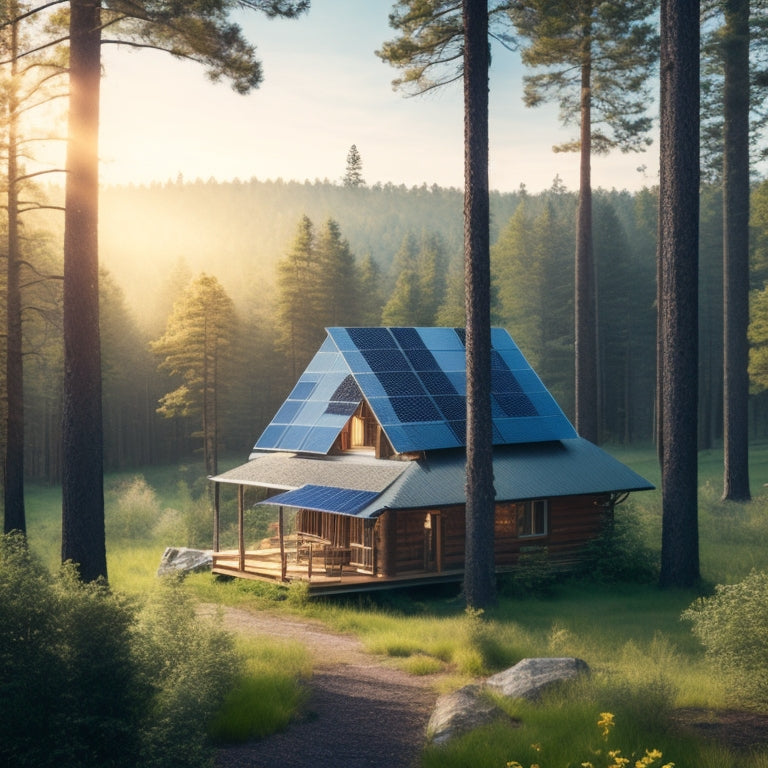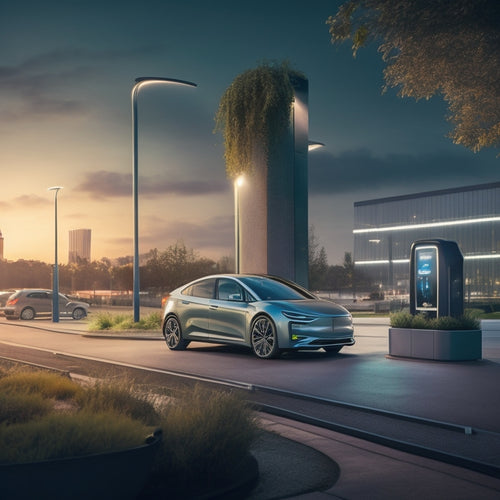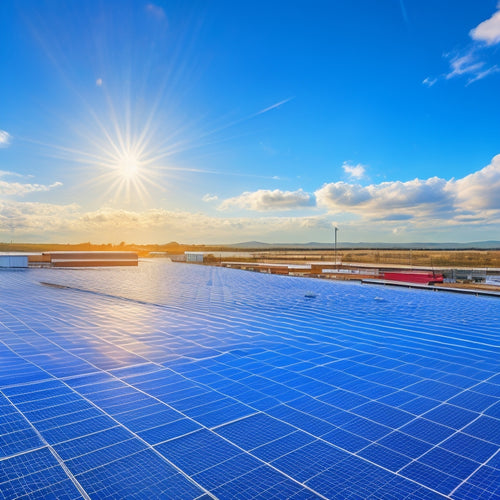
3 Essential Tips for Off-Grid Cabin Solar Power
Share
When setting up your off-grid cabin's solar power, you'll want to choose the right solar panels, ensuring they're efficient, durable, and compatible. Calculate your daily energy requirements to properly size your system, including panels, battery bank, and inverter. Don't forget to optimize energy efficiency by selecting appliances with low wattage ratings, like LED lighting and energy-efficient water pumps. By following these essential tips, you'll be well on your way to a reliable and efficient off-grid solar power system. Dive deeper to discover the intricacies of each step and guarantee a seamless shift to off-grid living.
Key Takeaways
• Choose solar panels with high efficiency, durability, and a 25-year warranty to ensure reliable energy production.
• Calculate your daily energy requirements by considering appliance wattage, usage hours, and total daily energy consumption.
• Opt for energy-efficient appliances, LED lighting, and proper insulation to minimize energy consumption and optimize your off-grid system.
• Select a solar power system with a suitable size, including panels, battery bank, and inverter, to ensure reliable and efficient energy supply.
• Consider using low-wattage appliances, such as a 12V refrigerator, to reduce energy consumption and optimize your off-grid system.
Choosing the Right Solar Panels
When selecting solar panels for your off-grid cabin, you'll want to take into account a few key factors, including efficiency, durability, and compatibility with your system's voltage and ampere requirements. One important aspect to take into consideration is panel durability. You'll want to choose panels that can withstand harsh weather conditions and last for many years.
Look for panels with a sturdy anodized aluminum frame, tempered glass, and a weather-resistant backing sheet. Additionally, think about the warranty options offered by the manufacturer. A thorough warranty can provide peace of mind and protect your investment. A good warranty should cover the panel's performance, materials, and workmanship for at least 25 years.
Some manufacturers may also offer a warranty on the panel's inverters and other components. By choosing high-quality, durable panels with a strong warranty, you can ensure your off-grid cabin's solar power system remains efficient and reliable for years to come.
Sizing Your Off-Grid System
To determine the size of your off-grid solar power system, you'll need to calculate your cabin's daily energy requirements, taking into account the wattage and usage hours of each appliance and device. This load calculation is essential in determining the right system configuration for your off-grid cabin.
| Appliance | Wattage | Daily Usage Hours |
|---|---|---|
| Refrigerator | 150W | 8 hours |
| Laptop | 65W | 4 hours |
| LED Lighting | 20W | 6 hours |
Using the table above, calculate the total daily energy consumption by multiplying the wattage by the daily usage hours for each appliance. Add up the total watt-hours (Wh) to get your daily energy requirement. For this example, the total daily energy consumption would be:
150W x 8h = 1200Wh (Refrigerator)
65W x 4h = 260Wh (Laptop)
20W x 6h = 120Wh (LED Lighting)
Total daily energy requirement = 1200Wh + 260Wh + 120Wh = 1580Wh
With this calculation, you can now determine the required size of your off-grid solar power system, including the number of solar panels, battery bank, and inverter capacity. A properly sized system will help you have a reliable and efficient off-grid solar power system for your cabin.
Optimizing Energy Efficiency
By choosing energy-efficient appliances and implementing a few simple habits, you can greatly reduce your cabin's daily energy consumption, thereby minimizing the size and cost of your off-grid solar power system.
When selecting appliances, look for those with the ENERGY STAR label, which indicates energy efficiency. Consider compact refrigerators, LED lighting, and energy-efficient water pumps. Additionally, choose appliances with low wattage ratings to reduce energy consumption. For instance, a 12V refrigerator consumes less energy than a 120V model.
Proper insulation strategies also play an important role in optimizing energy efficiency. Make sure your cabin is well-insulated to reduce heat loss during winter and heat gain during summer. This will decrease the load on your heating and cooling systems, resulting in lower energy consumption. Consider using insulation materials with high R-values, such as spray foam or fiberglass, to maximize energy efficiency.
Frequently Asked Questions
How Often Should I Clean My Solar Panels for Optimal Performance?
You should clean your solar panels every 2-4 months to prevent dust accumulation, which can reduce efficiency by up to 25%. Use deionized water to guarantee good water quality and avoid damaging the panels.
Can I Use a Generator as a Backup Power Source for My Cabin?
'As you navigate the wilderness of energy independence, a reliable generator can be a beacon of hope, but don't overlook important generator maintenance and fuel efficiency to guarantee your backup power source shines bright when you need it most.'
Are There Any Government Incentives for Off-Grid Solar Power Systems?
You'll be glad to know that yes, there are government incentives for off-grid solar power systems. You're eligible for Federal Rebates, and depending on your location, State Credits may also be available to offset your system's cost.
How Do I Monitor and Troubleshoot My Off-Grid Solar Power System?
As you gaze out at your off-grid cabin, envision a seamless flow of energy. To guarantee this, you'll conduct regular System Checks, performing Energy Audits to identify inefficiencies, and troubleshoot issues before they leave you in the dark.
Can I Add More Solar Panels to My System if My Energy Needs Increase?
You can easily upgrade your system to meet increasing energy needs by adding more solar panels, guaranteeing energy scalability; just make sure compatibility with your existing setup and reassess your energy storage and charging capabilities.
Related Posts
-

Solid State Batteries in Electric Vehicles
Solid-state batteries revolutionize electric vehicles by offering a longer lifespan and higher energy density than tr...
-

Solar Powered Lights for Sustainable Home Decor
Solar-powered lights offer a stylish and eco-friendly way to enhance your home decor. They capture sunlight, converti...
-

Commercial Solar Energy
As you consider powering your business with commercial solar energy, you'll uncover it offers a triple benefit: signi...


